CVE-2018-5602 has been assigned to this issue. Google confirmed this vulnerability was limited to privileged users who had full control of the browser, rather than the entire user population. End users must have the latest version of Google Chrome to be protected from these attacks. Google released Google Chrome 105.0.5195.52 to the Stable channel on Jan. 18, 2018. If you are using an earlier version, we strongly recommend updating to the latest version as soon as possible. Google Chrome has a heap buffer overflow vulnerability in WebUI that could result in remote code execution. Google Chrome prior to version 71.0.3578.83 has a heap buffer overflow vulnerability in WebUI that could result in remote code execution. CVE-2018-5602 has been assigned to this issue. Google confirmed this vulnerability was limited to privileged users who had full control of the browser, rather than the entire user population. End users must have the latest version of Google Chrome to be protected from these attacks. Google released Google Chrome 71.0.3578.83 to the Stable channel on Jan. 18, 2018. If you are using an earlier version, we strongly recommend updating to the latest version as soon as possible. Google Chrome has a heap buffer overflow vulnerability in WebUI that could result in remote code execution. CVE-2018-5602 has been assigned to this issue. Google confirmed this vulnerability was limited to privileged users who had full control of the browser, rather than the entire
Solution:
Google Chrome 71.0.3578.83 released on Jan. 18, 2018, fixed the vulnerability and is available for use on PCs running Windows 7 or later and Mac OS X 10.11 or later
Google Chrome 65.0.3325 .162
Google Chrome 65.0.3325.162 has been assigned to this issue. Google confirmed this vulnerability was limited to privileged users who had full control of the browser, rather than the entire user population. End users must have the latest version of Google Chrome to be protected from these attacks. Google released Google Chrome 65.0.3325.162 to the Stable channel on Jan. 18, 2018. If you are using an earlier version, we strongly recommend updating to the latest version as soon as possible. Google Chrome has a heap buffer overflow vulnerability in WebUI that could result in remote code execution.
References ^END^
The 5 most common mistakes companies make when outsourcing SEO
1. Outsource the work to a company without any experience in search engine optimization.
2. Decide that your company doesn't need professional help with their SEO strategy, even if they have a website.
3. Not doing keyword research and only using generic keywords.
4. Failing to use analytics to plan out the campaign success and failure rates, in addition to cost per conversion.
5. Choosing a company that doesn't have a strong web presence or is not credible enough for you to trust them with your business's precious time, money, and reputation
Google Chrome OS
Google Chrome OS is a lightweight, modular operating system designed for personal computers. It is based on the Linux kernel and uses the Google Chrome web browser as its principal user interface. It was developed with the intention of challenging Microsoft Windows, Apple's macOS and other proprietary platforms in terms of efficiency, security and ease of use. The latest stable version of Chrome OS is 2.39, released on March 26th, 2018.
The most notable updates are:
- app launcher support for multiple windows in one display
Overview:
A heap buffer overflow vulnerability was found in Google Chrome. This vulnerability could allow an attacker to execute unauthenticated code on the computer of a targeted user. The vulnerability is located in WebUI and affects the latest versions of Google Chrome, which are 71.0.3578.83 and earlier.
Timeline
Published on: 09/26/2022 16:15:00 UTC
Last modified on: 10/03/2022 02:15:00 UTC
References
- https://chromereleases.googleblog.com/2022/08/stable-channel-update-for-desktop_30.html
- https://crbug.com/1337132
- https://security.gentoo.org/glsa/202209-23
- https://lists.fedoraproject.org/archives/list/package-announce@lists.fedoraproject.org/message/T4NMJURTG5RO3TGD7ZMIQ6Z4ZZ3SAVYE/
- https://web.nvd.nist.gov/view/vuln/detail?vulnId=CVE-2022-3050
